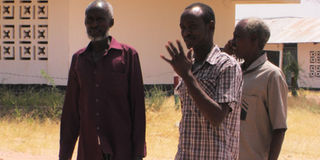Premium
Man’s ordeal in Al-Shabaab captivity

Photo/NURDIN ELMOGE
One of the three people kidnapped by Al-Shabaab, Dekow Mohammed (centre) with his father and uncle after he returned home safely.
Last Thursday was a normal day for 22-year-old driver Dekow Mohammed until more than 100 heavily armed Al-Shabaab militants raided an Administration Police camp at Gerille in Wajir County.
Mohammed was among three people who were kidnapped when the Somali militants attacked the camp, killing six people.
He was set free three days ago but fellow abductees, a district registrar of persons and a district officer are still being held captive.
On Friday, Mohammed, a driver with Al Qasa Investment which had been hired to transport registration of persons officials, narrated his harrowing experience at the hands of his captors.
Mohammed said after the abduction, they were blindfolded, handcuffed and driven to Somalia.
“During the time I was in captivity, we were only given one meal and water. However, they did not torture us,” he said.
He said they asked him if he was a government employee and when he told them he was not “they seemed less interested in me.”
Mohammed said when he was released, his fellow captives were in good health and had not been mistreated.
He said the militants did not give him any special message for the government or anybody else.
He was released three days ago in a town near Mogadishu and started the long journey to the Kenya-Somalia border.
“They separated me from my colleagues before the blindfolds and handcuffs, which were never removed, were finally taken off and I was told to go back home,” he said.
Without a penny to his name and only armed with his ability to speak the Somali language, Mohammed approached a group of camel herders for assistance.
“The first thing they gave me was milk before showing me the way to the Kenya-Somali border,” he said.
He said he started walking towards the border before he got a lift in a lorry which took him to Diif town in Somalia.
He then walked to the Kenya-Somalia border where he surrendered to Kenya Defence Forces (KDF) personnel in the area before taking a matatu to Wajir town.
Mohammed, a father of one, said since his return he had been interrogated by officers from the KDF, National Security Intelligence Service, police and Anti-Terrorism Unit.
Wajir DC George Otieno confirmed that security officials have been questioning Mohammed. “He is assisting our officers with their investigations into the Al-Shabaab attack,” he said.
On Wednesday, Al-Shabaab released pictures on Twitter claiming they were those of the district registrar of persons and district officer. (READ: Al-Shabaab release photos of abducted Kenyans)
The photos have been identified as those of Immigration clerk Fredrick Irungu and District Officer Edward Mule.
The militants attacked Gerille town near the Kenya-Somalia border just before 7pm and bombed the Administration Police camp, according to security officials in Wajir.
Last week, media reports quoted the militants warning that they would continue to raid towns inside Kenyan territory and carry out killings and abductions.
Al-Shabaab also released a propaganda video declaring war against Kenya.
The video was released by Sheikh Ahmed Iman Ali, the self-proclaimed de facto leader of Kenyan Al-Shabaab fighters in Somalia.
Sheikh Ali, in the video recording entitled: If they seek your help in religion, it is your duty to help them, says war or Jihad should now be waged in Kenya in response to the military operation in Somalia.
“Kenya has declared war against Somalia and Jihad should now be waged inside Kenya, which is legally a war zone,” Sheikh Ali says in the video.
The video, which was initially posted on YouTube but has since been withdrawn, can still be viewed on other social media networks.
Sheikh Ali says the war Kenya is fighting in Somalia is not against Al-Qaeda, Al-Shabaab or terrorists.
The latest report of the UN Somalia and Eritrea Monitoring Group says Sheikh Ali, a former chairman of the Muslim Youth Centre in Pumwani, Nairobi, was central in the recruitment of non-Somalis in Nairobi to join Al- Shabaab.




